How to Stop Cats Pooping in the Garden
We are frequently asked how to stop cats pooping in the garden. Certainly we love our cat Monty. We love cats, all of them and welcome them to Byther Farm. We keep them as pets and appreciate their excellent rodent catching skills. But nonetheless, I don’t enjoy the results of them using the garden beds for their toiletry needs.
There are several reasons you may want to prevent cats from pooping in your garden. For example, to keep the cats away to save young plants growing in your garden, to ensure that the area is kept clean and safe for your children to play in. Or to help to protect wild birds that visit your garden, especially if you provide good shelter for their nests or winter bird feeders.
Additionally, there are potential health risks of cat poo in the garden, it can carry parasites that are particularly dangerous to pregnant women and unborn babies. Therefore, it is very important to use gloves when you clean cat poo from your garden. Because there are many cats in our local area, I use gloves most of the time when gardening, as a precaution against infections.
I know that many people find cats pooping in the garden really annoying and to help retain or restore good neighborly relations, it might be useful to know some ways to discourage your own cats from using your neighbor’s garden.
Here are some suggestions of ways to deter cats from using the growing spaces as a litter box. All the images in this article are kindly provided by members of the Facebook group Friends of Liz Zorab – Byther Farm.
(Disclosure. Some of these are affiliate links. In other words, if you make a purchase we may earn a small commission. View our full disclosure statement)
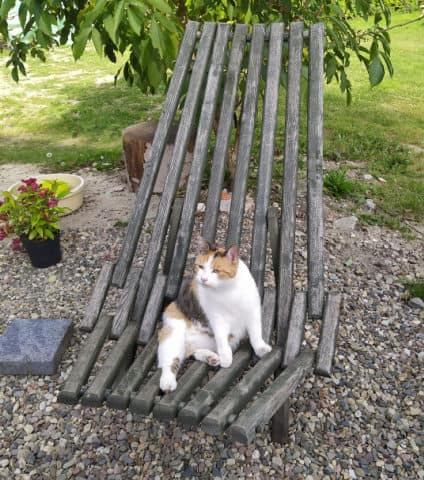
Cover The Soil
Cats love to use the softer soil of your garden beds because soft soil easy to dig in, after all, who wants hard work before they do their business? Covering the soil with a mulch or hard landscaping can deter cats from pooping in your garden. I mulch most of the growing beds with chopped straw or used animal bedding to improves the soil’s fertility and organic content, however it has the bonus effect of deterring the local cats from pooping in the garden beds.
Image courtesy of Tony Brennen
Prickly and sharp materials
You can put prickly or uncomfortable to walk on materials in your growing beds. Things like pine cones, eggs shells, bramble or rose cuttings laid along the ground may deter cats from pooping in the garden where you want to plant. I’ve also seen small eating forks pushed into the soil (tines facing upwards) in an attempt to persuade cats to go elsewhere. Just be careful that the objects and materials that you use are not so spiky or sharp that they could harm the cats. Remember that if they could hurt a cat that means they could also hurt you as you garden! You are just aiming to make the area less inviting for the feline visitors to walk or dig in.
This is a cheap option, useful if you have established growing beds. And there are several different things that to use as prickly materials. However, it’s not an ideal choice if you work the beds frequently and there is the potential that the objects can get moved by the weather, rain or wind. Additionally, it’s not terribly practical if you have a large growing area to protect.
Cat Noise Deterrent
These devices detect movement and emit a high-frequency sound, which is almost inaudible to humans but is irritating to cats.
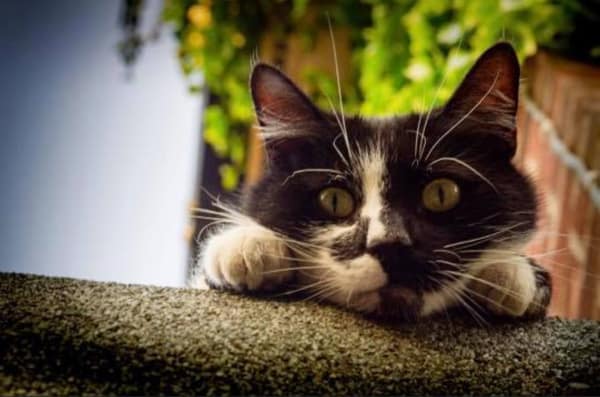
In the UK, you can find ultrasonic cat deterrent devices like the CATwatch cat deterrent and in USA something like the Pestbye® Battery Operated Motion Activated model. This is a safe and humane way to keep cats off of your garden. They usually have fully adjustable sensitivity and frequency. They deterrent is battery powered, so don’t need connecting to an electrical supply and they work 24 hours a day.
The movement detector is triggered and the sound is emitted over a fairly limited area, You will need to find the most effective places to put the device.
They are great because:
- They are easy to install – simply insert in the batteries, complete any simple assembly as required and place in the garden
- Minimum of maintenance required (although see the disadvantages below)
- The sound does not disturb humans
The downsides are:
- Batteries need to be replaced regularly. You need to check the device at regular intervals
- Needs to be positioned carefully so may take several trials to find the right spot
- Results are variable, as with all these methods.
Install Netting
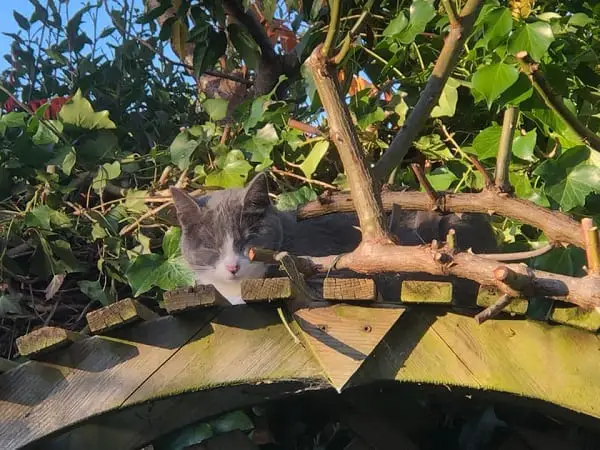
Using a fence or netting can be highly effective when you have a small or specific area to protect from cats pooping in the garden. It’s a relatively simple solution, can be cost-effective over a small area and prevents cats reaching the part of the garden you want to protect. However, this method is unpractical for larger areas and may not look terribly attractive. You will need to cover the area completely, netting will need to go from side to side and cover over the top. Cats are excellent at jumping high and may find a way into your netting if left uncovered. They might then become trapped inside the netted area, so be sure to make any netting secure on all sides and over the top of the area.
I often use netting over young plants to protect them from cats digging them up. I use either a fruit cage or brassica cage with butterfly netting or a homemade brassica tunnel for a short length of time, while the young plants are getting established.
Water Spray Deterrent
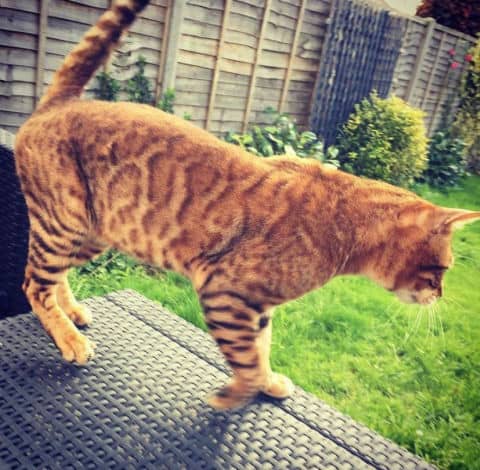
A spray deterrent is a motion-activated deterrent. It sprays a jet of water to surprise the cat away from the garden. Not just used to stop cats from pooping in the garden, it is effective for most animals. And can be used in more extensive gardens.
In USA something like this Orbit 62100 Yard Enforcer Motion-Activated Sprinkler with Day & Night Detection Modes. And in UK , this PestBye Jet Spray. They use infrared sensors and can detect movement and heat up to 10 metres (33+ feet) away. Cats will quickly learn the area is off limits and usually won’t return. However, you could keep the deterrent in place as a precaution.
The advantages of a water spray cat deterrent are:
- They are adjustable, so can be directed exactly where you want the water to be sprayed
- They are designed to be long-lasting
- Not only are they effective against cats, but can also deter other animals
But there are some disadvantages:
- They can be a more expensive method
- Are better for larger areas, so you may find it less useful in a small garden
- It requires continual connection to a water supply
Laying Chicken Wire
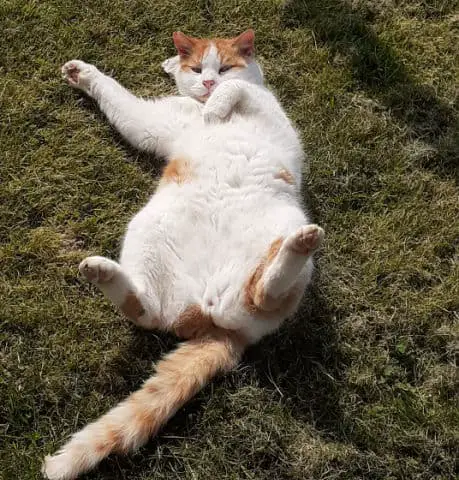
Cats don’t seem to like walking across chicken wire, so another deterrent could be to lay chicken wire on the ground surrounding the plants. This can work well in smaller areas, but for larger garden beds it is not the most practical idea. Although it should stop cats digging the soil, I have found that the neighbourhood cats are undeterred and simply squat on top of the chicken wire. This makes cleaning up an even more unpleasant job than when they have buried their ‘gifts’ in the soil!
Cat-proof fence
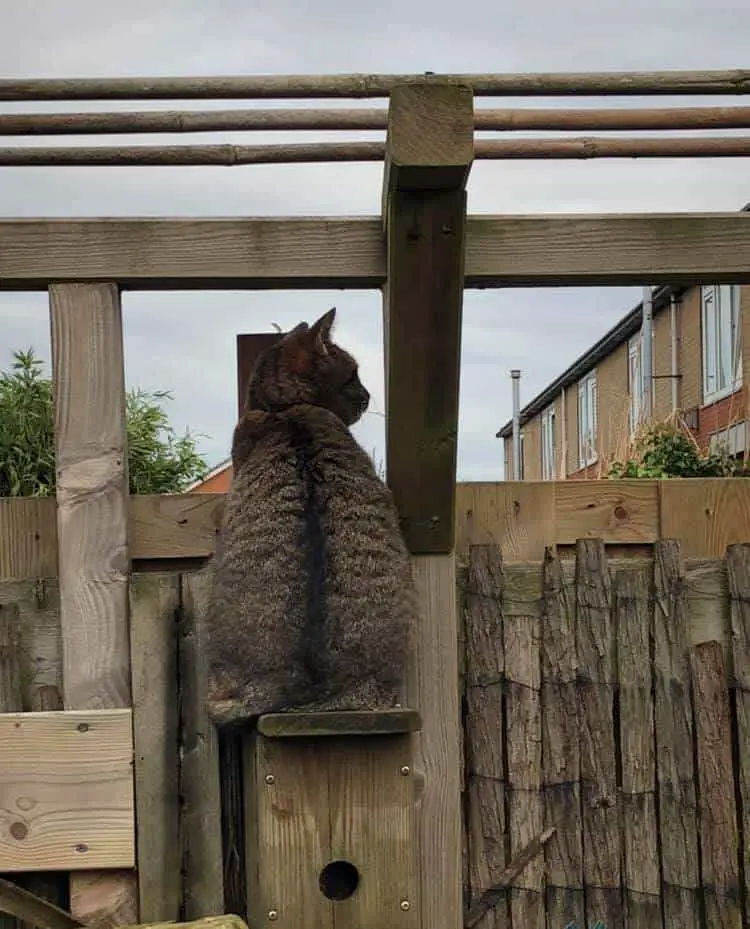
Potentially you could create a cat-proof fence and use a netting barrier or try anti-cat spikes along the top of the fence. The spikes are designed to make it awkward for a cat to walk along the fence, not to harm it.
Unless you can cover over the top of your garden with netting, I am not convinced that this method is very effective. Cats are incredibly agile, intelligent animals and can usually find a way out of an area unless if is full enclosed. Cats will roam a distance from their homes every day as seen in Secret Life of the Cat
Image courtesy of Esther Spekle
Lion Dung to stop cats pooping in the garden
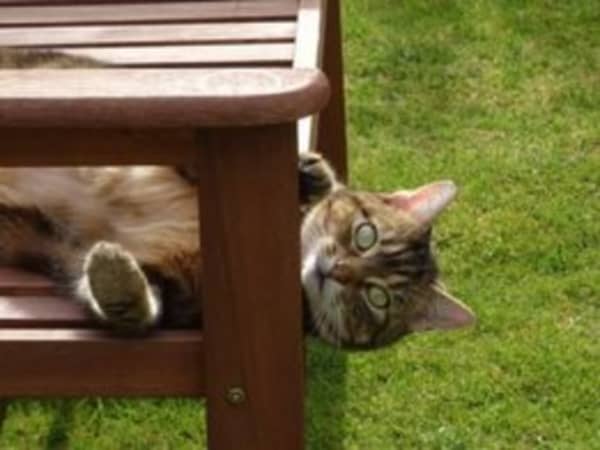
Lion dung works because of it’s strong smell. All cats are territorial as can be seen in the fabulous BBC Horizon program The Secret Life of the Cat and they mark their territory by spraying and rubbing glands on their faces and other parts of their bodies. Lion dung works because its highly strong aroma says that there is a big cat around! Like all these methods, some cats won’t be bothered by it. It is a cheap option and it’s easy to use, but remember that you are replacing one type of poop for another, so be careful how you handle it! In the USA, try Primrose Silent Roar lion dung and in the UK, try the same brand of lion dung.
Aromatic Repellents
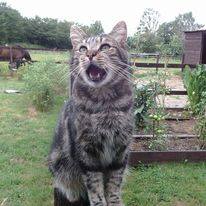
As we saw with the lion dung, cats can be sensitive to scent and aromas, so using strong smells in the growing beds may deter cats from pooping in the garden. You can make sprays, sprinkle dried materials or grow plants with strong scents. Many cats dislike the smell of peppermint, lavender and cinnamon. The main advantages of this option is that they can easily be made at home, are entirely natural , are not toxic to the cats or you (unless you have allergies) and can be cost effective, especially if you have the space to plant lavender or have pots of peppermint in your growing beds. If you use sprays or sprinkle dried materials you will need to replace them very regularly and if you use living plants, you are taking up growing space for other plants.
Image courtesy of Jo Gardner
Animal Shapes with Reflective or Glowing Eyes
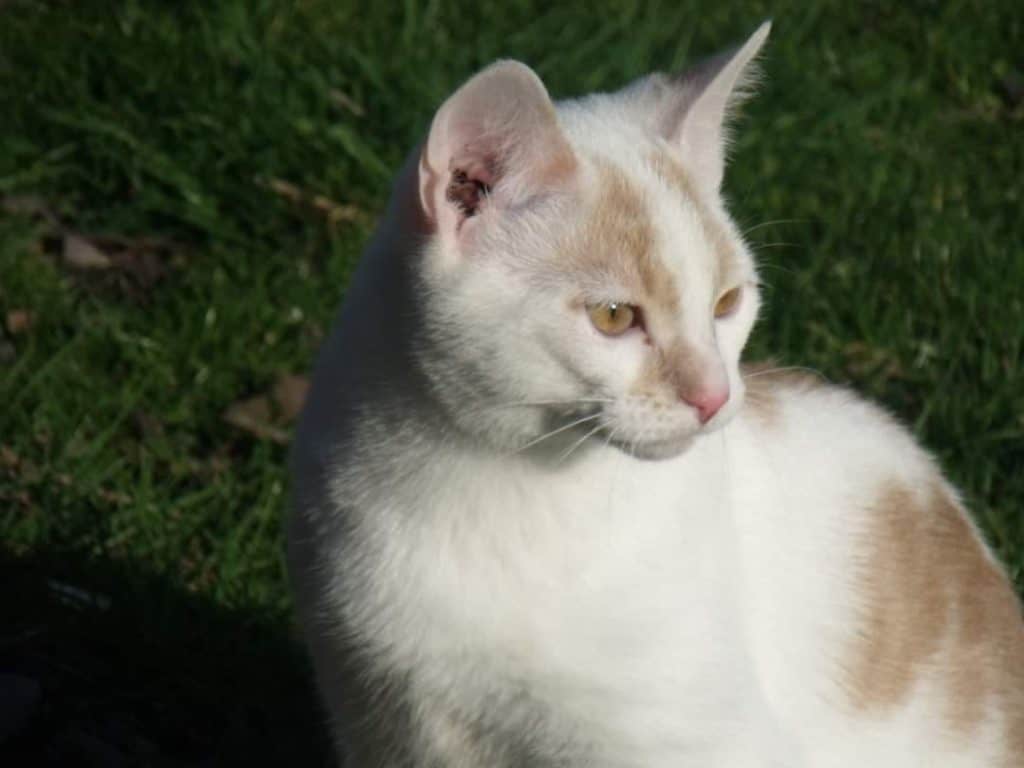
Usually made from metal, the animal shapes are fitted with eyes that glow or are reflective giving the appearance of another animal in the garden. The eyes are either made from a reflective material like glass or may have eyes that light up using solar energy. They come in a variety of animal shapes. I think are most effective to stop cats pooping in the garden when they are moved on a regular basis. They are easy to install and move and require little to no maintenance. Unlike sprays and dried materials they are weatherproof. In the USA, try something like these cat repellents and in the UK, like these cat shapes. But like any of these ideas, they may not be effective and cats that are regular visitors to your garden might become used to it.
Citrus Peels
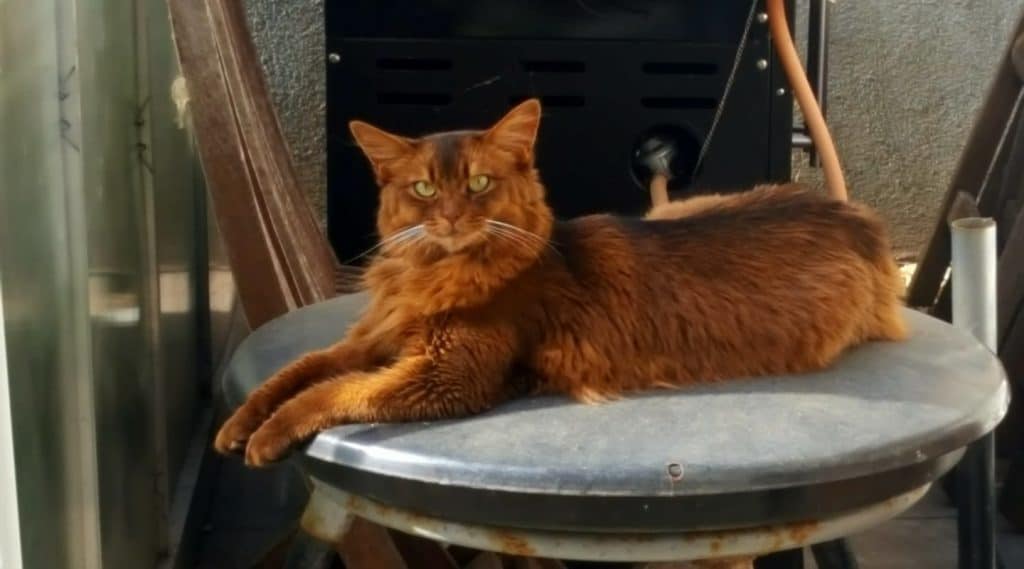
Another idea of how to stop cats pooping in the garden cats is to scatter citrus peelings around the garden beds. Generally cats do not like the smell of citrus, so will veer away from places that smell of it. This option is free if you simply save the peels from citrus fruits when you use them in the kitchen. And because it will break down over time, it will add organic matter to your soil. Alternatively, you can use citrus oils, but be careful not to drop undiluted citrus oils on your plants.
It is a short-lived solution as the peels will become less effective in a fairly short time. You need replenish the citrus peel on a regular basis. Some cats ignore citrus peel’s wonderful repellent properties and try to eat them.
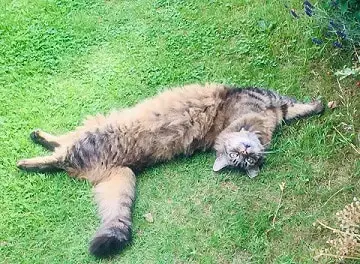
So, there are several ways to try to stop cats from pooping in your garden. Some are more effective than others. But if you want to deter the unwanted feline visits to your growing beds, it is worth trying and testing several the cheap or free methods or mixing them up and changing the method regularly.
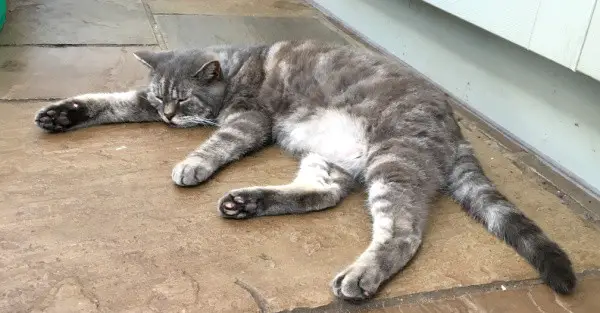
Encouraging Cats Elsewhere
An alternative to trying to stop cats pooping in your garden beds is to provide an area that is more inviting to them. This may draw them away from your precious young plants and seeds to ‘do their business’ in a place that matters less.
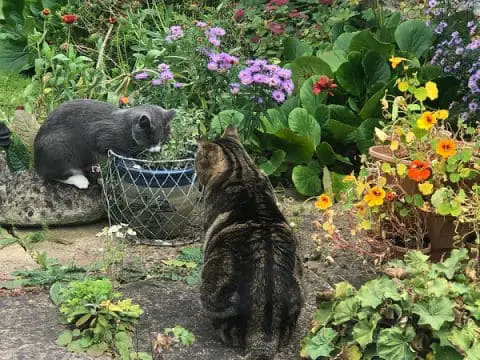
As cats like to be in the warmth, select a sunny spot, use plants that cats love, like catnip to draw them away from your growing beds. The downside of this is that it might attract even more cats into your garden! You could create a sand pit area as cats like to poop in the soft sand, however you will need to clear it regularly.
Image courtesy of Nicola Croke
Please note that keeping cats from fouling the garden is a matter of trial and try again, because not every method will work with every cat.
Images in this article supplied by followers of our Facebook page Byther Farm.
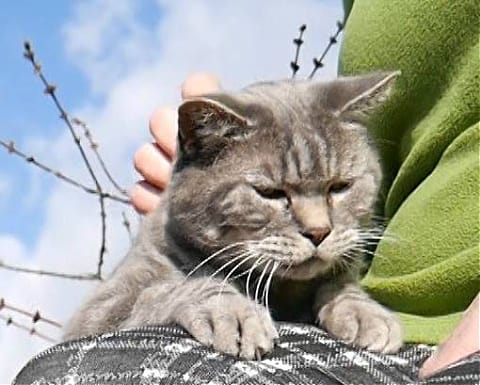
More gardening articles that may interest you
Gardening Mistakes and How to Avoid Them
- Biennials to sow in June and July - September 12, 2025
- Protected: Urban back garden - August 28, 2025
- White garden in early summer - August 28, 2025

Thank you for this article, it is great to have a review of all the different methods which can be attempted. We had a major issue with new neighbours’ cats (they started off with three cats and there have since been at least two litters of kittens) pooping in our garden as previously unclaimed cat territory with lovely soft soil in our flower and veg beds. The neighbours in question don’t have any flowerbeds in their garden and so their cats venture outside for their toileting needs.
After looking through all the various methods to deter them from entering our garden, my husband and I tried plastic spikes in the fence tops with no joy, then fishing line suspended above the fence (they just balanced somehow on the edge of the fence top and pushed the line aside with their bodies), we have finally tried lengths of chicken wire stretched along our fence tops – about 40cm above the fence top supported by bamboo canes screwed into the fence posts and stapled to the fence panels below. This has stopped the problem because the cats can’t sit on the fence tops to jump down head first into our garden. It has been a huge relief to have stopped them entirely and to have a safe car poo free environment for our young children to play and dig in. The chicken wire is remarkably not too ugly either and well worth it.
I can’t stop them entering the flowerbeds outside our house, but I am planting a border of thorny ground cover roses, covering the whole bed with comfort bark chip mulch and then spreading dried holly leaves over the top of that in the hope of making it a very uncomfortable toilet option.